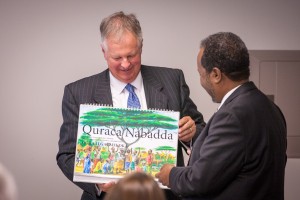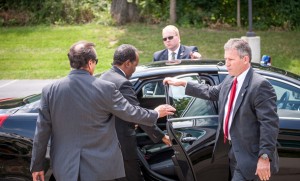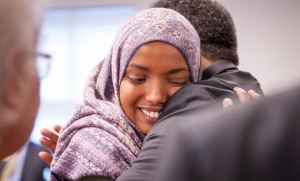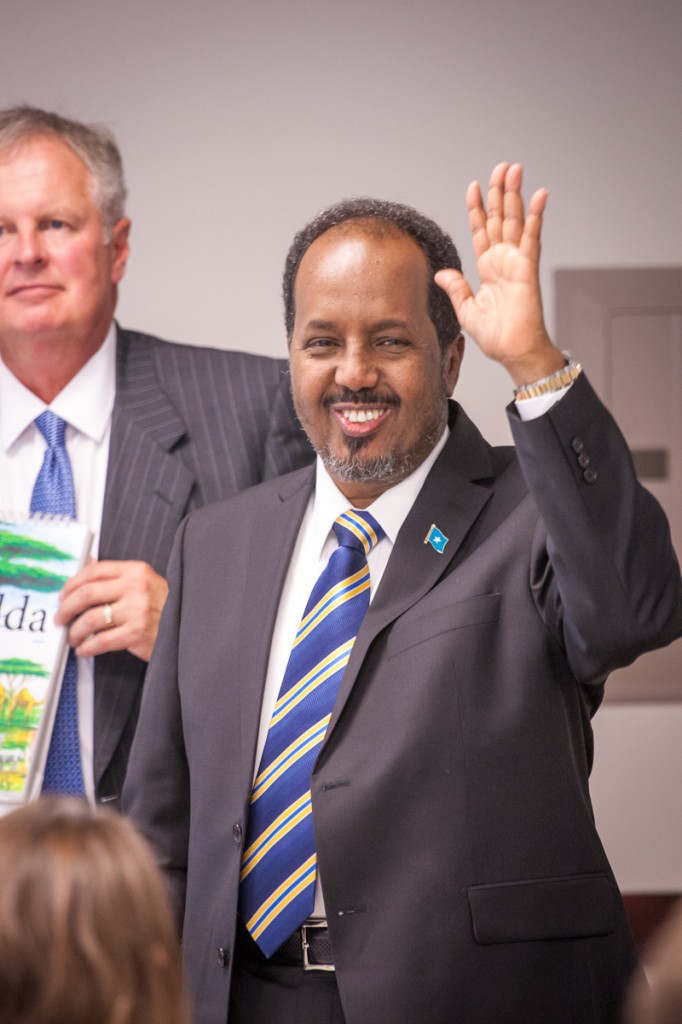Somalia President Hassan Sheikh Mohamud topped off attendance at the historic U.S.-Africa Leaders Summit hosted by President Obama with a visit to Harrisonburg, Virginia, on Aug. 7, where he renewed 13-year-old ties with Eastern Mennonite University and its Center for Justice and Peacebuilding (CJP).
In a conversation-style talk at tables set for an intimate lunch, Mohamud told EMU leaders: “I’d like to officially request your help for Somalia with the tools and techniques you have here, which are very life-saving tools – not [only] life-saving at the individual level, but life-saving at a nation level.”
He commended CJP’s Women’s Peacebuilding Leadership Program, which has 16 Somali-speaking women as graduates or current students: “You educate a woman, you educate a family. You educate a family, you educate a whole nation.”

He added that another important group to nurture as peacebuilders is the youth of his country, who constitute the largest segment of its population and who have spent much of their lives experiencing violence and displacement. “All of their lives [have been] unstable for a long time. They keep running, one place after another.”
The young of Somalia need trauma healing, education, and work opportunities in order not to be vulnerable to recruiting by terrorist organizations, he said.
CJP program director Jayne Docherty concurred with Mohamud’s observation, saying: “We don’t want to create a society where young men are drawn into violence because they have no prospects for a positive life, while young women are taught to be peacemakers.”
EMU’s commitment to Somali region
Docherty touched on EMU’s “long commitment to the Somali region.” She spoke of celebrating the graduation of CJP’s first cohort of Somali women in the peacebuilding leadership program at a ceremony held in neighboring Somaliland in December 2013. There she felt “great hope,” but also heard the women express “the need to connect large-scale work on trauma healing with any initiatives to rebuild the country.”
Mohamud arrived in Harrisonburg in a mid-sized black car sandwiched between two other black vehicles, with accompanying members of the U.S. Secret Service.
“We are always honored when our former students return to campus, [but] to my knowledge, you are the first Summer Peacebuilding Institute alumnus to return with a motorcade,” said CJP executive director J. Daryl Byler in his welcoming remarks, evoking a warm smile from the Somali president.
How this president came to know EMU
CJP’s direct connections to Somalia include alumna Khadija Ossoble Ali, who earned her master’s in conflict transformation from CJP in 2001. Ali then became a member of Somalia’s parliament and served in the prime minister’s cabinet. She left Somalia in the mid-2000s due to political changes and began pursuing a PhD at George Mason University’s School for Conflict Analysis and Resolution in Virginia. With her doctorate just completed, she recently met with Mohamud in Somalia where they spoke of new responsibilities for her. (The president conveyed her personal greetings to EMU.)

After Ali began studying at CJP in the late 1990s, she recommended EMU’s Summer Peacebuilding Institute (SPI) to Mohamud, who was then an educational leader in Somalia. (He is the founder of what has evolved into Simad University in Mogadishu, with 5,000 students.) Mohamud took three of SPI’s intensive courses in 2001, focusing on mediation, trauma healing, and how to design learner-centered trainings.
“My brothers and sisters,” he said, recalling his time at SPI, “this is another great day in coming back here after more than 10 years away.” Since Mohamud’s time at SPI, more than a dozen Somali men and women have attended SPI, plus many others who have Somali roots but enroll in SPI from Kenyan, U.S., or other addresses (SPI does not track its participants by ethnicity).
“After I left here,” Mohamud recounted, “I extensively traveled in Somalia, mediating [between] different communities and clans [which] were having conflicts for different reasons.”
Understandings, patience, helped by SPI teachings
“The tools and the instruments that I took from here helped me a lot in sitting with the people, having the patience and the endurance to listen to sometimes irrational arguments,” he said.
Fortunately, Mohamud said, his SPI training helped him to realize that the people speaking irrationally and often choosing destructive paths were burdened by psychosocial traumatic baggage as a result of their constant exposure to violent conflict.
Unfortunately, he added, Somalia remains a tinderbox. A destructive act by even one person can undermine years of efforts at peacebuilding and reconciliation and spark widespread attacks of one group against another.
Threatened by terrorists
In this environment – with Somalia’s still-weak, distrusted governmental bodies – the terrorist group Al-Shabaab has played a viciously destabilizing role in Somalia and indeed the entire region, Mohamud said. Members of this group tried to kill Mohamud in a hotel assault four days after he became president on Sept. 10, 2012, and have launched other attacks on him over the last two years, sometimes killing people around him.
On a positive note, Mohamud said Somalia is a “very, very rich country” in terms of possibilities for its people to thrive once stability is achieved. It has millions of hectares of arable land, two strongly flowing rivers, the longest coastline in Africa, and the most livestock per capita. He pointed out that Somalia is situated at one of the “most strategic locations in the world.”

The meeting was held in an area that could be easily secured by the Secret Service and local police. Twenty-six representatives of EMU joined Mohamud and his accompanying group of eight for remarks and lunch at The Gathering Place, a relatively secluded meeting area on the back side of Common Good Marketplace, near the southeast corner of EMU’s campus.
Mohamud singled out Kaltuma Noorow, a rising junior at EMU, for special attention at the luncheon, giving her a warm hug as he departed. He praised her deceased mother, Dekha Ibrahim Abdi, a Somali-Muslim renowned for her peace work in East Africa, for insisting that the “cross-cutting subject” of peacebuilding be woven through the required coursework of all students at Simad University.
Fruits of interfaith work
As one of three who spoke on behalf of EMU, Byler explicitly referred to the interfaith nature of EMU’s work with Somali-speaking people, who are largely Muslim.
Byler quoted two passages from the Holy Quran that “whoever saves a life, it is as though he had saved the lives of all humankind.” And: “Have you seen him who denies the religion? He is the one who harshly rebuffs the orphan and does not urge the feeding of the poor.” Byler offered Psalm 82:3 as having a similar message for Jews and Christians: “Give justice to the weak and the orphan; maintain the right of the lowly and destitute.” The Somali president nodded in affirmation as Byler spoke these words.
As a sign of CJP’s commitment to Somalia and the rest of the Horn of Africa, Byler said CJP is establishing its first “practice and learning hub” to “partner with and support our [East African] alumni as they engage in this challenging work” of addressing the deeply rooted, systemic problems that feed the cycles of violence.
EMU President Loren Swartzendruber presented the president of Somalia with several gifts, including training materials in the Somali language used by EMU’s Strategies for Trauma Awareness and Resilience program.

A fine example of the impact EMU is having at an international level with CJP which crosses religious boundaries.
N. Wayne Yoder
Kabul, Afghanistan
What a remarkable man, and what an honor to have him so connected to EMU!
A great opportunity and another resounding affirmation for the important work of EMU CJP!